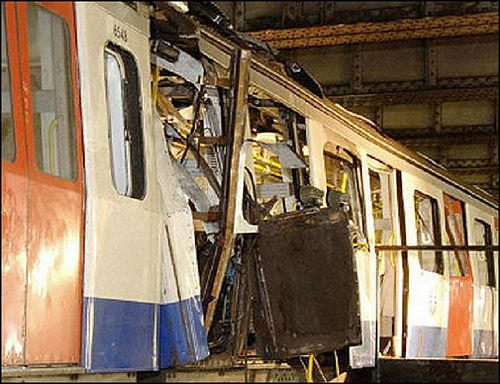Lessons from the Mt. Igman Road

I cut my teeth in national security on one of the ugliest, most complicated, flawed, yet ultimately successful international challenges of recent memory: bringing peace to Bosnia. From the dark days of feckless UN ineffectiveness (1993) until the dark days of the ad-hoc airstrikes over Serbia (2000), Bosnia was my focus and education. My boss at the Pentagon died for Bosnia (on Mt. Igman -- "the most dangerous road in Europe" as Dick Holbrooke called it). And I invested most of my public service to its cause. As far as I can tell, few others worked the issue for such length and intensity so perhaps my lessons learned are relevant.
As many of you recall, when Yugoslavia crumbled into pieces just after the Cold War, Bosnia was the one that fell squarely in the crap. Slobo Milosevic (genius dictator) decided that Serb nationalist domination was a good replacement for Communism and surprise, surprise, all the non-Serb Republics went running for Europe. Slovenia escaped without a scratch. Croatia got mostly free in a short tussle. So Milosevic sent in the Serb army (with deathsquad garnish) to ensure the multiethnic Bosnia didn’t get off so easy. And it didn’t.
Four years of brutal civil war and international hand-wringing over the crisis had produced genocidal slaughters, flood of refugees to Europe, an embarrassment for UN peacekeeping, and a growing division in NATO about how to respond to aggression and genocide in Europe.
Critics on both right and left attack Clinton’s Bonia policy for doing to little or too much for humanitarian reasons. In reality, humanitarian concerns were always a secondary factor behind geopolitics. The decision to launch proximity talks in Spring 1995 and the resulting mission in Bosnia was still internally driven by national interests not human rights considerations (although the public case was much more driven by human rights as it tends to be).
Many remained insistent that this was not a mess the US should jump into, most notably the Pentagon (still focused on “real wars” like the Gulf War). But the Europeans were desperate for NATO help and NATO essentially meant the US. The war was hemmoraging human values and the credibility and unity of NATO in a delicate time of Western integration of the former Soviet Bloc states. The geopolitical case was now as profound as the humanitarian case… we could now do the right thing for cool calculated national security interests.
Now many liberals pissed at the Bush Administration for lying about Iraq don’t realize that foreign policy spin was a Clinton Adminstration vice as well. The problem is that honesty about geopolitical ambitions or concessions doesn’t sell like tyranny and alarm. So the Bosnia mission was described not as a geopolitical necessity for Western cohesion during a period of CEE integration, but as a humanitarian savior of the poor Muslims from the evil Serbs. Similarly, the Clinton team decided that concerns about quagmire might be easily deflected by confidently assuring all we’d be gone in 12 months (off by about 100 months).
We did NOT promise that we’d be met with open arms as liberators. In fact, there was a lot of anticipation of broad resistance by extremist groups, militias, or even the Dayton signatories themselves (particularly the Serbs). Wes Clark and George Joulwan deserve great credit for devising a military annex to Dayton and an IFOR plan that effectively killed armed resistance to the NATO mission.
Those who though that arming and supporting the Bosniaks was the moral policy (“Lift and Strike”) typically fail to acknowledge or recognize that this policy was politically impossible without creating broad damage to our European security agenda. Again, national interests trumped humanitarian considerations. Even if you remain convinced it was the right thing to do, its naive or dishonest to raise the issue without acknowledging the radioactivity it was with the Europeans and the huge slate of issues we had going with Europe to bring the CEE states into the Western sphere.
Finally, the Dayton agreements best endorsement come in the form of its near equal criticism from both sides of the question about whether Bosnia should be divided or reintegrated. Idealists (and Bosniak sympathizers) believe the inter-entity boundary and the slow return of refugees reflects a failure of Dayton to live up to its own ideals. Realists (and Serb/Croat sympathizers) believe Dayton’s overly idealistic provisions of long term integration into a multi-ethnic state confuse and delay acceptance of new boundaries. In fact, Dayton achieved that balance and ambiguity needed to close the gap between unreconcileable deeply held divisions sewn in war. We Americans (and military thinkers particularly) tend to look for solutions to problems… preferably solutions with clarity and finality. Yet desires for solution, clarity, and finality are often the worst enemies of peace whereas process, ambiguity, and delay can be peace’s greatest friend. Thanks to former boss and mentor Jock Covey for best explaining to me this maxim of diplomacy.
The implementation of Dayton offers a whole different set of lessons, many covered in my earlier post Dirty Secrets of War. The most profound was the total disconnect between the military and civilian sides of implementation. That divide has remained largely unbridged since then and was relived in a similar form in Iraq. The failures of Phase IV in OIF have finally created some serious efforts to address this flaw. No doubt we will just get it right in time for major war with China.



